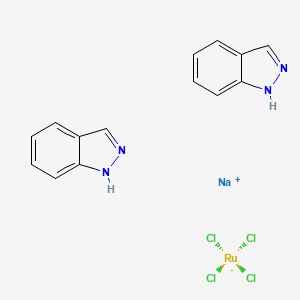m6A-centered Drug Response Information
General Information of the Drug (ID: M6APDG01232)
| Name |
NKP-1339
|
||||
|---|---|---|---|---|---|
| Synonyms |
197723-00-5; KP-1339; EX-A1916; BCP26252; Z-3126; 1H-indazole; tetrachlororuthenium(1-) sodium salt
Click to Show/Hide
|
||||
| Status |
Phase 1
|
||||
| Structure |
 |
||||
|
3D MOL
|
|||||
| Formula |
C14H12Cl4N4NaRu
|
||||
| InChI |
1S/2C7H6N2.4ClH.Na.Ru/c2*1-2-4-7-6(3-1)5-8-9-7;;;;;;/h2*1-5H,(H,8,9);4*1H;;/q;;;;;;+1;+3/p-4
|
||||
| InChIKey |
WVVOCRYXBTVDRN-UHFFFAOYSA-J
|
||||
| PubChem CID | |||||
| TTD Drug ID | |||||
Target Gene(s) and Their Upstream m6A Regulator, Together with the Effect of Target Gene(s) in Drug Response
The target genes involved in drug-target interaction (such as drug-metabolizing enzymes, drug transporters and therapeutic targets) and drug-mediated cell death signaling (including modulating DNA damage and repair capacity, escaping from drug-induced apoptosis, autophagy, cellular metabolic reprogramming, oncogenic bypass signaling, cell microenvironment, cell stemness, etc.) could be regulated by m6A regulator(s) and affected their corresponding drug response. You can browse detailed information on drug-related target gene(s) mediated by m6A regulators.
Endoplasmic reticulum chaperone BiP (HSPA5)
Methyltransferase-like 3 (METTL3)
| In total 1 mechanisms lead to this potential drug response | ||||
| Response Summary | Endoplasmic reticulum chaperone BiP (HSPA5) is a therapeutic target for NKP-1339. The Methyltransferase-like 3 (METTL3) has potential in affecting the response of NKP-1339 through regulating the expression of Endoplasmic reticulum chaperone BiP (HSPA5). | [1], [2] | ||
YTH domain-containing family protein 2 (YTHDF2)
| In total 1 mechanisms lead to this potential drug response | ||||
| Response Summary | Endoplasmic reticulum chaperone BiP (HSPA5) is a therapeutic target for NKP-1339. The YTH domain-containing family protein 2 (YTHDF2) has potential in affecting the response of NKP-1339 through regulating the expression of Endoplasmic reticulum chaperone BiP (HSPA5). | [1], [2] | ||
Stress-activated protein kinase JNK1 (JNK1)
Methyltransferase-like 3 (METTL3)
| In total 1 mechanisms lead to this potential drug response | ||||
| Response Summary | Stress-activated protein kinase JNK1 (JNK1) is a therapeutic target for NKP-1339. The Methyltransferase-like 3 (METTL3) has potential in affecting the response of NKP-1339 through regulating the expression of Stress-activated protein kinase JNK1 (JNK1). | [3], [4] | ||
RNA demethylase ALKBH5 (ALKBH5)
| In total 1 mechanisms lead to this potential drug response | ||||
| Response Summary | Stress-activated protein kinase JNK1 (JNK1) is a therapeutic target for NKP-1339. The RNA demethylase ALKBH5 (ALKBH5) has potential in affecting the response of NKP-1339 through regulating the expression of Stress-activated protein kinase JNK1 (JNK1). | [4], [5] | ||
References